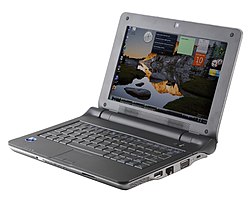
AirPort is a discontinued line of wireless routers and network cards developed by Apple Inc. using Wi-Fi protocols. In Japan, the line of products was marketed under the brand AirMac due to previous registration by I-O Data.

Broadcom Corporation was an American fabless semiconductor company that made products for the wireless and broadband communication industry. It was acquired by Avago Technologies for $37 billion in 2016 and currently operates as a wholly owned subsidiary of the merged entity Broadcom Inc.
OQO was a U.S. computer hardware company that was notable for manufacture of handheld computers. Its systems possessed the functionality of a tablet PC in a size slightly larger than a personal digital assistant (PDA). According to Guinness World Records, the "OQO" was the smallest full-powered, full-featured personal computer in 2005. The company's first version of subnotebook computer was the OQO model 01. It had been compared with the Ultra Mobile PC platform, although it was introduced before the UMPC took flight. The company was founded in 2000.

Dell XPS is a line of consumer-oriented laptop and desktop computer series manufactured by Dell since 1993.
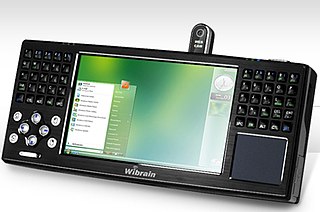
An ultra-mobile PC, or ultra-mobile personal computer (UMPC), is a miniature version of a pen computer, a class of laptop whose specifications were launched by Microsoft and Intel in Spring 2006. Sony had already made a first attempt in this direction in 2004 with its Vaio U series, which was only sold in Asia. UMPCs are generally smaller than subnotebooks, have a TFT display measuring (diagonally) about 12.7 to 17.8 centimetres, are operated like tablet PCs using a touchscreen or a stylus, and can also have a physical keyboard. There is no clear boundary between subnotebooks and ultra-mobile PCs, but UMPCs commonly have major features not found in the common clamshell laptop design, such as small keys on either side of the screen, or a slide-out keyboard.
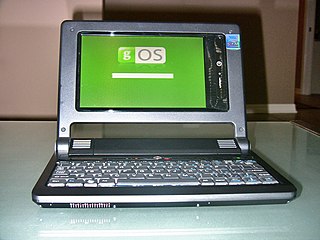
The NanoBook is an ultra-mobile PC reference design by VIA Technologies, Inc. It has a clamshell form factor, a 7-inch 800×480 touchscreen display, and a full-size keyboard. It weighs less than 850g and has a claimed battery life of up to 4.5 hours. It is based on the VIA VX700 chipset, featuring the VIA UniChrome Pro II IGP integrated graphics and powered by the 1.2-GHz VIA C7-M ultra low voltage processor. It includes up to 1 GB DDR2 memory, a minimum 30-GB hard drive, 802.11g WiFi, Bluetooth and Ethernet support, as well as a 4-in-1 card reader, a DVI port and two USB 2.0 ports.
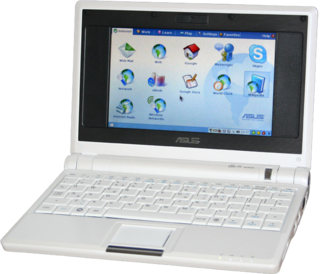
The ASUS Eee PC is a netbook computer line from Asus, and a part of the ASUS Eee product family. At the time of its introduction in late 2007, it was noted for its combination of a lightweight, Linux-based operating system, solid-state drive (SSD), and relatively low cost. Newer models added the options of Microsoft Windows operating system and rotating media hard disk drives (HDD), and initially retailed for up to 500 euros.

The OLPC XO is a low cost laptop computer intended to be distributed to children in developing countries around the world, to provide them with access to knowledge, and opportunities to "explore, experiment and express themselves". The XO was developed by Nicholas Negroponte, a co-founder of MIT's Media Lab, and designed by Yves Behar's Fuseproject company. The laptop is manufactured by Quanta Computer and developed by One Laptop per Child (OLPC), a non-profit 501(c)(3) organization.

Dell Vostro is a line of business-oriented laptop and desktop computers manufactured by Dell aimed at small to medium range businesses. From 2013–2015, the line was temporarily discontinued on some Dell websites but continued to be offered in other markets, such as Malaysia and India.

The MacBook Air is a line of laptop computers developed and manufactured by Apple since 2008. It features a thin, light structure in a machined aluminum case and currently either a 13-inch or 15-inch screen. The MacBook Air's lower prices relative to the larger, higher performance MacBook Pro have made it Apple's entry-level notebook since the discontinuation of the original MacBook line in 2011.
The Elonex ONE was a netbook computer marketed to the education sector by Elonex. The ONE's operating system was called Linos, based on Linux kernel 2.6.21, and the device had Wi-Fi connectivity, Ethernet networking, a solid-state hard drive, two USB ports and weighed less than 1 kg.

The HP Pavilion dv9000 was a model series of laptops manufactured by Hewlett-Packard Company that featured 16:10 17.0" diagonal displays.
The Dell Inspiron Mini Series is a line of subnotebook/netbook computers designed by Dell. The series was introduced in September 2008 amidst the growing popularity of low-cost netbook computers introduced by competitors.
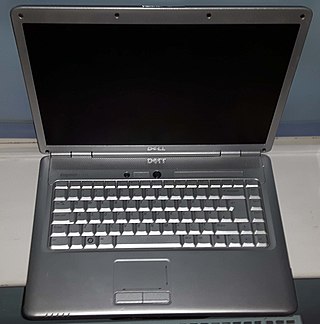
The Inspiron 1525 is a laptop designed and distributed by Dell as part of their Inspiron product line. There is also an AMD variant known as the Inspiron 1526. The laptop is the successor to the Inspiron 1520, and was released on January 4, 2008. This computer was available to purchase on the Dell website, where it could be customized to the user's specification.

HP Mini is a former line of small computers categorized as netbooks manufactured by Hewlett-Packard. They either contained a custom version of Ubuntu Linux, Microsoft Windows XP Home Edition or Windows 7 Starter operating system. Like most netbooks, they were not built with CD/DVD drives. They were announced from mid-2007, and marketed from 2008 through 2012.

The Samsung Galaxy Player was a line of Android-based all-purpose pocket computers produced by Samsung. The product was debuted on 2 September at the 2010 IFA in Berlin, and was showcased at the 2011 CES in Las Vegas.

The ThinkPad X series is a line of laptop computers and convertible tablets produced by Lenovo with less power than its other counterparts. It was initially produced by IBM until 2005.

The IdeaPad S Series is a series of notebook computers launched by Lenovo in October 2008. The IdeaPad S10 was initially scheduled for launch in September, but its release was delayed in the United States until October.
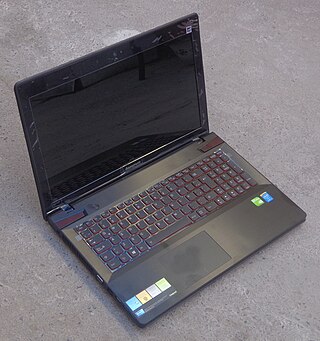
The IdeaPad Y series was a consumer range of laptops produced by Lenovo, first announced in 2008. They were marketed as premium high performance laptops for multimedia and gaming, as part of the IdeaPad line.

The Pinebook is a low-cost notebook developed by Hong Kong-based computer manufacturer Pine64. The Pinebook was announced in November 2016 and production started in April 2017. It is based on the platform of Pine64's existing Pine A64 single board computer, costing US$89 or US$99 for the 11.6" and 14" model respectively. Its appearance resembles the MacBook Air. The Pinebook is sold "at-cost" by Pine64 as a community service.
